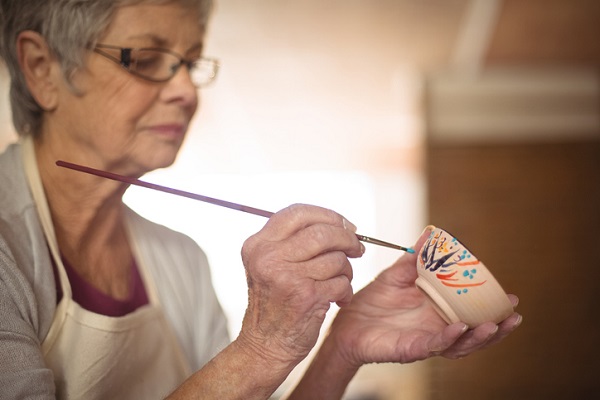When people think of creative individuals, all too often the image of the tortured artist comes to mind. Not only is this association of creativity with negative emotions a cliché, but it also distracts from the fact that creativity has powerful and positive effects on overall wellbeing
A growing body of research is proving that far from poor mental health being a prerequisite for creativity, creativity is in fact fostered by—and in turn promotes—positivity in almost all areas of life. This article will examine why creativity is so important to wellness.
Using Creativity to Reduce Stress and Other Health Problems
Stress has a negative impact on our physical, mental, and emotional wellbeing. Studies have shown that high levels of stress are linked with mood disorders, cardiovascular disease, gastrointestinal problems, reduced immune system function, a decline in memory, and reduced cognitive functioning (Yaribeygi et al., 2017). Creativity, however, plays a vital role in combating stress.
For example, in one study researchers gave 39 participants various art supplies and told them to make any artwork they wanted over a period of 45 minutes. The results showed that there was a statistically significant decrease in cortisol—the hormone that the body releases in response to stress—in the participants after the 45 minutes. This decrease was regardless of participants’ previous artistic experience, which ranged from none to extensive (Kaimal et al., 2016). The results suggest that by incorporating creativity into your own life and those of your clients, you can help foster relaxation and help decrease stress levels.

Creativity leads to a decrease in stress regardless of previous artistic experience
Students in Wellness College Recognize the Benefits of Daily Creativity
There are also long-term benefits to be had from making creative endeavours a part of one’s daily routine. One study by researchers in New Zealand asked 658 young adults to keep a daily diary over a 13-day period in which they reported time spent on creative activities and levels of positive and negative emotions. The study found that respondents had higher levels of positive emotions in the days after they engaged in creative projects (Conner et al., 2016).
The study helped show that creativity’s positive effects aren’t just immediate, but rather improve wellbeing long after the creative task has ended. For students in wellness college, the results suggest that creativity can be made into a daily habit.
Creativity and Positivity Work Together to Create a Virtuous Circle
Creativity leads to positivity, but the inverse is also true: positivity fosters creativity. In one study, participants listened to an upbeat version of Bach’s Brandenburg Concerto No. 3 and were then asked to come up with one word that unified three seemingly disparate words: “mower,” “atomic,” and “foreign.” Normally, such words are associated with “lawn,” “bomb,” and “currency” respectively, so to find a single unifying word the participants had to think creatively. Those who were exposed to the uplifting music were more likely to figure out that the unifying word is “power” (Chicago Tribune, 2006).
This implies that positivity and creativity are involved in a virtuous circle whereby one leads to the other. It’s an important discovery that helps shed light on why professionals with a diploma in wellness counselling often encourage their clients to pursue creative endeavours.

Positivity can lead to an increase in creative thinking, which in turn leads to more positive thinking
Are you ready for a new career?
Contact Rhodes Wellness College to learn more about our wellness college in Vancouver.
Works Cited
Kaimal, G., Ray, K., & Muniz, J. (2016). Reduction of Cortisol Levels and Participants’ Responses Following Art Making. Journal of the American Art Therapy Association, 33(2), 74-80. doi: 10.1080/07421656.2016.1166832.
Keller, M.S. (2006, December 19). Happy is helpful, but fear fosters focus. Chicago Tribune. Retrieved from http://www.chicagotribune.com.
Conner, T.S., DeYoung, C.G., & Silvia, P.J. (2018). Everyday creative activity as a path to flourishing.The Journal of Positive Psychology, 13(2), 181-189. doi: 10.1080/17439760.2016.1257049
Yaribeygi, H., Panahi, Y., Sahraei, H., Johnston, T. P., & Sahebkar, A. (2017). The impact of stress on body function: A review. EXCLI journal, 16, 1057–1072. doi: 10.17179/excli2017-480.










